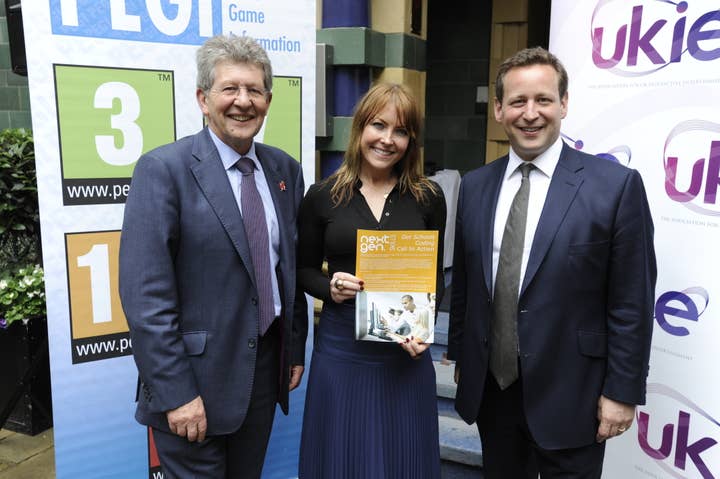UKIE: Looking Out For The Little Guy
Dr Jo Twist explains the thinking behind UKIE's new focus on start-ups, micro-studios and independent developers
Dr. Jo Twist took the reins at UKIE during one of the most interesting periods in the UK industry's history: within a week of her first day the next-gen skills campaign reached its crescendo, two months later George Osborne confirmed that the games industry would some form of tax relief, and at the end of this month the PEGI classification system will become law. For trade bodies like UKIE and TIGA, these are the good times.
But Twist knows that these hard fought legal and political victories are only the start of the job, not the end. More than anything, entities like UKIE exist to aid and educate the companies that consitute the UK games industry, and, last week, Twist outlined its new strategy; one that more clearly recognises Britain's thriving community of start-ups, micro-studios and independent developers.
GamesIndustry International caught up with Twist at the recent Develop conference in Brighton to discuss UKIE's broader remit, where TIGA now fits into the picture, and what's being done to ensure that those tax credits benefit everybody.
Yeah, I think that's fair. UKIE re-branded 18 months ago, and that was a broad recognition that we needed to change because the industry has changed, in terms of representing not only publishers but the full breadth... And I came from a particular background: I only worked with indie developers when I was commissioning games with Alice at Channel 4... So this strategy is really building on the brilliant work that the team has already been doing, but really focusing it on what we need to offer indie developers, micro-studios, and the people who are trying to redefine what interactive entertainment means.
" I would love to collaborate more with TIGA, and I always hold a hand out for that, especially around things like the tax consultation process"
Only in the same way that TIGA is reaching out to some of our members... It's just a reflection of the way the industry is. We would both be stupid not to service the needs of our industry players. That means, yes, that sometime we're overlapping, but Richard [Wilson, CEO, TIGA] and I have a really good relationship, and we talk, which is a good thing. I would love to collaborate more with TIGA, and I always hold a hand out for that, especially around events and things like the tax consultation process - we're both going out as trade bodies and having conversations with members and non-members about how that should work. It would be great if we could do that together, but at the very least Richard and I are going to be talking about what we've found.
When I talk to members and non-members about what they need from us, they need research, they need analysis, they need events, they need promotion outside of the games industry, they need influence on policy at a very high level. Now, TIGA is doing that, too. I think we have more resources, to be fair. We already have that breadth of membership - more than half of them are non-publisher members - so we already represent a very broad family of interactive entertainment.
When I speak to smaller companies and micro-studios, they have very specific issues that they need help with...and they need things like standard contracts, help with human resources, advice about HMRC tax, or how to qualify for tax credits. We can provide a one-stop shop for that kind of information, for everyone in the industry - not just members.
We're doing a lot of this already. This is as much about communicating that, because people don't realise what we're doing for developers, for publishers, and the whole industry. We're doing a lot more events, a lot more networking opportunities - almost every week - but the new stuff is more tangible, like the "quick guides" and the directories, and that's going to come with the website. And hopefully the website will be able to service the industry's needs in a more efficient way.

But there is a need to prioritise, and the priority for me over the next 6 to 8 months is start-ups and micro-studios. We are overtaken by events sometimes: when I came into this job, who would have thought that in the first week you'd have Michael Gove talking about computer science on the curriculum, which is happening in September, and in March, tax credits.
Yeah, absolutely, so it's about redefining and repositioning what a trade association means. Most people wouldn't know what a trade association actually does. Part of what this is about is communicating how we're relevant to [developers], and just for them to know that we're here to help. I mean, we're non-profit; we're literally here as a public service, for developers and their needs.
A lot of our work is kinda behind-the-scenes, in constant conversation with government and policy makers, and media, doing pro-active press... And that may not have immediate impact for an indie developer who just wants to know how to fill out a tax return, or how to raise finance to get a game off the ground. We can help guide you through that; we can help promote your business.
"It's becoming less and less the case that you just release a game to retail and that's it, so the tax production credit has to reflect that"
The tax credits are coming in at a good time, when the industry is transitioning. We did a lot of work before the government put out its consultation document to show them the different business models. Our industry is completely different to the film and TV industries in terms of business models. We have a very different story to tell in terms of how our industry works, and the government is really fascinated by the breadth of our business models. It's becoming less and less the case that you just release a game to retail and that's it...so the tax production credit has to reflect that.
Yes it can. And this is why they need to do the three-month consultation. Both TIGA and UKIE are doing regional round-tables in order to make sure we cover all the bases. The government is really keen that the credits go to the people who actually make games. That's fundamental, no matter what size you are. The slight issue is that, if you're a start-up, you probably won't benefit immediately, because you're not trading yet.
That's a shame, so there's still that funding gap for that kind of company. But at the same time as the consultation around the tax production credits, we're doing a lot of work around crowd-funding and innovative ways to access finance. We're not just a one-trick pony.
For more information on UKIE's new strategy, including a full breakdown of its three programmes of activity, follow the link.









